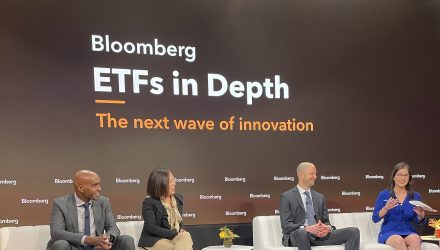In a panel discussion called The Great ESG Debate: What Does the Future Have in Store? ETF Store President Nate Geraci spoke along with State Street’s Michael Andeberhan and Purview’s Linda Zhang, with Bloomberg’s Shaheen Contractor moderating.
ESG has been surprisingly controversial, sparking widespread debate in the investment community. U.S. ESG flows skyrocketed in the past two years – only to plummet in 2022. Answering why this is, Geraci said, “I think the obvious answer is performance.” With many ESG ETFs growth-orientated and full of tech, they’ve been dragged down quite a bit this year. While tech and growth have stumbled, energy has held up well. “Performance is king in the financial markets,” Geraci said, noting that ESG has also become more politicized. Advisors tend to want to be agnostic, making the politicization of ESG a bit of a headwind.
Andeberhan said, “it’s certainly created a cloud around the discussion of ESG.” He doesn’t see the political climate as likely to change, with ESG likely to have momentum among blue states but resistance in red states.
Geraci thinks that people are also starting to question whether they can even “do good” with investments. Combined with the underperformance, he isn’t sure that investors will come back to ESG.
According to Contractor, much of ESG’s growth came as larger institutions poured money into the space. She noted that many anti-ESG firms have started popping up. Geraci isn’t particularly bullish on either pro or anti-ESG ETFs. “People are fatigued on polarized politics,” he observed.
“This is a very troubling trend that everything is becoming politicized,” Zhang said, concurring that this will be trouble for flows going forward. Both politicization and more stringent regulatory requirements are going to impact ETFs going forward, according to Zhang. She thinks these circumstances have made the general climate around ESG muddy.
Andeberhan noted that though anti-ESG is making a lot of noise, their resolutions are only receiving about 7% of the proxy votes.
Zhang noted that funds like the iShares ESG Aware MSCI USA ETF (ESGU) might have ESG on the label, but it does contain fossil fuels. “This isn’t the only ESG product that has that problem,” she said, pointing to a lack of industry agreement about what counts as ESG. “If you agree with 99% of scientists around the globe that we need to do something,” Zhang said, going on to say that it is important to take investment opportunities that are consistent with a net zero future. She said the messaging of ESG needs to be clearer, “we need to tell why this is exciting.” She said that social justice should be apolitical.
“When you talk to certain state legislators that are dependent on fossil fuels, that’s a difficult conversation,” Andeberhan said in response to Zhang. “To go from where we are today to a clean energy future, there’s a transition that needs to happen.”
Geraci noted that “ESG is highly personal. Everyone has preferences.” He pointed to Tesla as a company that, from an environmental standpoint does well, but falls when you look at the ‘S’ and ‘G’ side of ESG, to the point where it is excluded from some ESG ETFs, such as the SPDR S&P 500 ESG ETF (EFIV).
In response to the ongoing performance question that plagues ESG funds, Zhang said, “why do we hold ESG to a higher standard? Why does it always have to outperform?” She pointed out that every fund has performance that goes up and down, but ESG receives extra scrutiny when it underperforms and very little recognition when it does well. She believes that across every sector there are companies that pollute excessively and companies that are better and it is possible to detoxify a portfolio.
“Unless there is regulation to say this constitutes an ESG company, there’s always going to be a separation,” Andeberhan said, speaking to how some companies can do well in one section of ESG and poorly in another. He continued, “disclose everything and your score is going to vary wildly.” Andeberhan believes that the number of possible data points can create a complicated picture.
Zhang pointed to the website fossilfuelfree.org as a useful tool for investors considering the environmental side of ESG in their allocations.
“Who is going to decide what’s ESG? Is the SEC going to do that? That seems very problematic to me,” Geraci said, noting he is unsure how to regulate.
Andeberhan noted the regulations can help alleviate concerns some investors have around ESG, especially as politicization creates fear and uncertainty, though he isn’t sure how regulatory bodies can get there right now.
“ESG is not about doing good. It’s an evolution of investing theory,” Zhang said, noting that ESG is ultimately about long-term risk management.
“I feel like the democratization is going to continue,” Andeberhan said.
For more news, information, and analysis, visit the ESG Channel.

